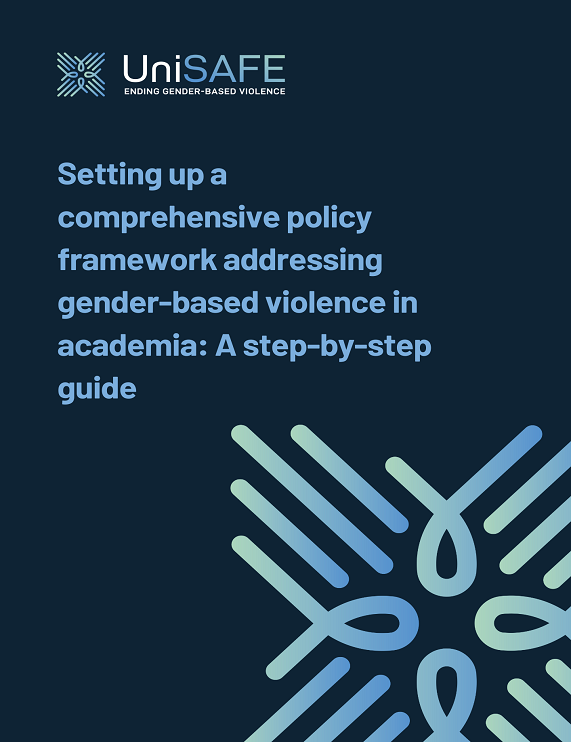
Resources and capacity-building materials
If you are seeking training materials, webinars or additional resources, you’ve come to the right place! Here you can find a wealth of valuable resources and opportunities for learning about addressing gender-based violence.
UniSAFE resources
Setting up a comprehensive policy framework addressing gender-based violence in academia: a step-by-step guide
The step-by-step guide entitled “Setting up a comprehensive policy framework addressing gender-based violence in academia: a step-by-step guide” is specifically designed for those in the early stages of creating and implementing a policy framework to address gender-based violence within academic settings. This document supports the development of an actionable roadmap, referred to as an Action Plan, which provides a clear and detailed set of actions for designing, implementing, enforcing, monitoring, and evaluating the comprehensive policy framework. The guide comprises a series of main steps, each with its unique focus: Step 1 – Getting Started, Step 2 – Analysing and Assessing the Institutional Context, Step 3 – Designing the Action Plan, Step 4 – Implementation, and Step 5 – Monitoring and Evaluation.
Step-by-step guide to awareness-raising campaigns on gender-based violence
The “Guide to awareness-raising campaigns on gender-based violence” is a step-by-step guide for representatives from universities and research organisations, offering valuable insights into the development of awareness-raising campaigns and the replication of inspiring practices. Its intended audience includes communication officers, gender equality/equality or diversity officers, and any interested staff members. Within this guide, the user will discover three inspiring practices: the “Poster campaign to raise awareness about sexual harassment” executed by the University of Namur, Belgium; “Ask for Angela” implemented by Leeds Beckett University, UK; and “DON’T TURN A BLIND EYE” (#UNIUNIECONTRE LE HARCÈLEMENT) from the University of Geneva, Switzerland. The guide provides materials that empower the audience to replicate the poster campaign initiated by the University of Namur and customise it to suit their institutional context, using the adaptable documents included.
UniSAFE Crisis Communication Checklist: A checklist for research and higher education institutions on crisis communication about cases of gender-based violence
This checklist is designed to guide research and higher education institutions through the challenging process of crisis communication in the event of a case of gender-based violence at the institution getting wide, public attention. This document provides a structured approach to navigating these complex matters, ensuring effective communication, victim protection, and preservation of institutional integrity. It is intended for administrators, communication professionals, and any staff involved in addressing gender-based violence (e.g. Gender Equality officers, Gender Equality committees, task forces or working groups on gender-based violence, human resources personnel and legal advisors, etc.).
Developing a Protocol for addressing gender-based violence in research and higher education institutions: UniSAFE guidelines
The “Guidance for Protocol development” serves as a comprehensive guide for research and higher education institutions seeking to create protocols addressing gender-based violence within their settings. The guidelines include UniSAFE’s definition of a Protocol, its key elements, and offer practical tips and hints. Additionally, a selection of sample practices implemented within higher education and research organisations is presented. These guidelines are primarily designed for staff members tasked with the development and implementation of protocols for addressing gender-based violence within their respective institutions. By adhering to these comprehensive guidelines, institutions can cultivate safer environments and institute effective measures to address gender-based violence, fostering a climate of security and inclusivity
Facilitating change: A guide to using case stories in co-creation activities for addressing gender-based violence
The guidance document “Facilitating change: A guide to using case stories in co-creation activities for addressing gender-based violence” is meant as a reference document for all who intend to use participatory techniques in co-creation workshops to explore gender-based violence in their institution. The guide includes five newspaper articles on real cases, gathered from publicly available sources and translated into English, together with instructions and practical details. This series of articles sheds light on the complexities and challenges faced in addressing gender-based violence. The articles can, for example, be used in ice-breaking activities for trainings addressing gender-based violence. In the context of UniSAFE’s co-creation workshops, the articles have triggered meaningful discussions and fostered dialogue on addressing gender-based violence in an institutional context. The use of these articles has thus been tested and was found particularly useful by the workshop participants to identify gaps in addressing gender-based violence within higher education institutions and develop corresponding solutions.
Facilitating change: addressing gender-based violence in co-creation activities through fictional characters
The guide on the use of personas introduces a range of fictional characters that represent diverse individuals who have different backgrounds, experiences and perspectives related to gender-based violence in research and higher education. These personas serve as a dynamic tool to enrich co-creation and participatory activities as well as training sessions, promoting discussions and a better understanding of the challenges faced in addressing gender-based violence. The use of personas also allows to check the application of (planned) measures by verifying how they would affect the different personas. The guide is meant for a variety of professionals to help them review and develop policies and build skills.
Set of recommendations
This document encompasses a series of focused factsheets, each targeting distinct stakeholders: policy-makers at various levels, higher education and research-performing organisations, research funding organisations, research institution associations and umbrella organisations, staff associations, student associations and unions.
UniSAFE capacity-building materials
Webinars
UniSAFE rolled out three webinars on the analytical framework of UniSAFE, the 7Ps model; 7Ps standing for Prevalence, Prevention, Protection, Prosecution, Provision of services, Partnerships, and Policies, where featured guest speakers presented during each webinar practices built according to the 7Ps model that have been implemented by European institutions and which succeeded in establishing institutional policies that address gender-based violence.
In addition, a webinar dedicated to university and research organisation representatives across Europe and associated countries was organised. This webinar aimed to provide information about the organisation of awareness-raising campaigns on gender-based violence at research institutions informing about the main steps and important considerations to organise a campaign and presenting two successful practices from European Universities.
Further enriching this webinar series, UniSAFE presented a webinar that delved into strategies for addressing gender-based violence without relying on formal complaints building upon the work of Dr. Anna Bull, an expert on sexual harassment in higher education. The webinar includes an interactive session where members from the UniSAFE community as well as the audience engaged with Dr. Bull, discussing practical applications of her strategies.
UniSAFE Webinar: The 7Ps Framework
This three-part webinar series aims to present UniSAFE’s 7P model with featured guest speakers sharing inspiring practices that have been successfully implemented by European institutions.
Target groups:
- Gender equality officers/focal points/equality and diversity officers
- Human Resources officers
- Ombudspersons
- Gender Equality Plan team members
- Health and safety officers
- Heads of Department/Unit in charge or involved in gender-based violence.
Guidance and Webinar “Create Successful Awareness-raising Campaigns on Gender-based Violence and your University”
This webinar addresses university and research organisation representatives across Europe and associated countries intent on organising an awareness-raising campaign on gender-based violence at their institution.
Proactive strategies in higher education: Addressing gender-based violence without formal complaints
This webinar addresses strategies addressing gender-based violence without formal complaints, building upon the work of Dr. Anna Bull, an expert on sexual harassment in higher education.
Training materials for trainers and change agents
UniSAFE developed a series of training scripts and materials for use by trainers and change agents at higher education institutions and research organisations. These scripts are designed to assist them in providing capacity-building activities to the academic and research community. The training materials provided aim to help trainers and change agents understand the specific context of each training session, including information on the training approach, format, preparation guidance, supporting materials, scripts, templates, and more.
The list below offers additional details on the objectives of each training, the target audience (beneficiaries), the format and duration of the sessions, as well as links to the supporting documents for each training programme.
Trainers are encouraged to make necessary adjustments to the script to suit the national context, as long as they stay true to the key messages and content of the training and maintain UniSAFE’s brand and logo. We welcome anyone who has translated our materials to share their translations with us by writing an email to toolkit@unisafe-gbv.eu
Creating a safe space for discussion and dialogue in a training session on gender-based violence (online & offline)
For an effective training session, it is important to ensure that participants feel comfortable, respected and supported throughout the training, preventing re-traumatising and triggering of the participants. This guide provides some practical tips for trainers and change agents.
Setting up and Implementing Institutional Policies to Address Gender-Based-Violence in Academia (In-person)
The aim of this training is to provide participants with a comprehensive understanding of gender-based violence and its impact on academic environments and demonstrate the prevalence of gender-based violence in the research field and highlight its specific characteristics. This session aims to introduces the 7P model of UniSAFE and to share successful practices that have been implemented by European research-performing organisations in establishing and executing institutional policies and practices addressing the issue. The materials have been designed for an in-person session with an estimated total duration of 6 hours.
A training for:
- Gender equality officers/focal points/equality and diversity officers
- Human Resources officers
- Ombudspersons
- Gender Equality Plan team members
- Health and safety officers
- Heads of Department/Unit in charge or involved in gender-based violence.
Additional materials:
Setting up a comprehensive policy framework addressing gender-based violence in academia: a step-by-step guide
Active Bystander Intervention Training (In-person)
The training on active bystander intervention aims to educate institution members (staff and students) on gender-based violence and provide them with the necessary skills to recognise and intervene in risky and inappropriate situations. The programme includes interactive exercises, examples of the gender-based violence continuum, role-playing and discussions on identifying risk and inappropriate situations and making safe interventions. The material have been designed for an onsite session with an estimated total duration of 3 hours.
A training for:
- Administrative staff
- Faculty members
- Researchers and students
- Anyone wishing to be empowered as active bystanders and to take preventive actions by intervening in potentially harmful situations
Active Bystander Intervention Training (Online)
The training on active bystander intervention aims to educate institution members (staff and students) on gender-based violence and provide them with the necessary skills to recognise and intervene in risky and inappropriate situations. The programme includes interactive exercises, examples of the gender-based violence continuum, role-playing and discussions on identifying risk and inappropriate situations and making safe interventions. The material have been designed for an online session with an estimated total duration of 2 hours and 40 minutes.
A training for:
- Administrative staff
- Faculty members
- Researchers and students
- Anyone wishing to be empowered as active bystanders and to take preventive actions by intervening in potentially harmful situations
Webinar for students without knowledge on gender-based violence
This educational webinar focuses on cultivating a comprehensive understanding of gender-based violence within the framework of research organisations and higher education institutions. It delves into the intricate nature of these issues as manifestations of gender inequalities and power dynamics. The module encourages open discussions and examples of gender-based violence, power relations and interventions. Tailored for Bachelor and Master students with no previous knowledge of gender-based violence, this module serves as a valuable introduction to the topic of gender-based violence and interventions to promote a safer and more equitable university and research environment. The material have been designed for an online session with an estimated total duration of 2.5 to 3 hours.
A training for:
- Bachelor and Master students with no or little previous knowledge on gender-based violence
Webinar for students with pre-knowledge on gender-based violence
This educational webinar focuses on cultivating a comprehensive understanding of gender-based violence and sexual harassment within the framework of research organisations and higher education institutions. It delves into the intricate nature of these issues as manifestations of gender inequalities and power dynamics. The module encourages open discussions and offers recommendations of interventions implemented by student unions/ associations and individual students, to address these concerns effectively. Furthermore, it emphasises the significance of integrating gender-based violence and sexual harassment policies into broader institutional reforms. The material have been designed for an online session with an estimated total duration of 3 hours.
A training for:
- Bachelor and Master students with some preliminary knowledge on gender-based violence
- Student Union and Student Association responsible for working on gender-based violence
- Feminist student organisation members
Webinar for doctoral students/researchers and early career researchers
This webinar is designed for doctoral (PhD) candidates, post-doctoral scholars, early career researchers, project and similar researchers, with the aim of fostering a safer and more inclusive academic environment. Through engaging sessions, participants will further their understanding of the features of doctoral and research environments that might affect gender-based violence. Understanding and responding to gender-based violence is centre stage, using active bystander intervention, effective communication, taking a stand and creating positive change. The material have been designed for an online session with an estimated total duration of 3 hours.
A training for:
- Doctoral (PhD) candidates
- Post-doctoral students
- Early career researchers
- Masters students doing research
- Project researchers
Webinar for Teachers in Higher Education Institutions and Research Organisations
Designed for teachers/educators within higher education institutions and research organisations who possess intermediate to advanced expertise in teaching about gender-based violence, this comprehensive training aims to equip them with insights, and strategies needed to effectively address and educate about gender-based violence, within the academic context, using the knowledge and insights gained by UniSAFE. Participants will gain a nuanced understanding of the significance of gender-based violence in educational and research settings, explore the complexities of power dynamics and resistance when teaching on this topic, and learn pedagogical approaches to engage students and professionals in meaningful discussions and learning experiences. This educational webinar focuses on cultivating a comprehensive understanding of the importance of integrating the subject of gender-based violence into teaching. The training provided encompasses not only educators focused on gender equality but also extends to individuals in scientific fields, emphasising the intricate interconnection of gender-based violence across diverse domains, such as law, psychology etc. Through interactive sessions and collaborative discussions, this training encourages educators to go beyond the classroom, fostering a culture of empathy, empowerment, and positive change in both teaching and research domains. The material have been designed for an online session with an estimated total duration of 3 hours.
A training for:
- Teachers/Educators in higher education institutions and research organisations with intermediate or advanced expertise in teaching about gender-based violence.
Additional material:
Recommended reading lists for seminars
This document is a compilation of material and resources curated for students with and without prior knowledge of gender-based violence, doctoral students, early career researchers, and educators in higher education and research organisations. It aims to offer valuable and comprehensive resources to deeper into gender-based violence in academia. This list goes hand in hand with the respective capacity-building material developed by UniSAFE.
External resources
Guides and toolkits
Hassan, S., & Sanchez-Lambert, J. (2019). It’s not that grey. A practical guide for the twilight zone of sexual harassment. Period. Brussels. Explore further.
Irish Consortium on Gender Based Violence. (2022). Guide to Ethical Storytelling on Gender-Based Violence. Explore further.
Theofilopoulos, T. (n.d.). Universities towards Diversity: Inclusive Practices Guide (ISBN: 978-618-81828-6-8). METHEXI Laboratory – Panteion University of Social and Political Sciences. Explore further.
Academic publications (articles and books)
Free access
Anitha, S., Marine, S. B., & Lewis, R. (2020, February 1). Feminist responses to sexual harassment in academia: voice, solidarity and resistance through online activism. Journal of Gender-based Violence; Policy Press. Explore further.
Avveduto, S., Badaloni, S., Hermann, C., Martinelli, L., Rubbia, G., & Zoppè, M. (Eds.). (2019). #WeTooInScience – Sexual Harassment in Higher Education Institutions and Research Organizations. CNR-IRPPS e-Publishing. Explore further.
Gialopsos, B. M. (2017, April 3). Sexual Violence in Academia: Policy, Theory, and Prevention Considerations. Journal of School Violence, 16(2), 141–147. Explore further.
Restricted access
Campbell, R., Goodman-Williams, R., & Javorka, M. (2019, September 12). A Trauma-Informed Approach to Sexual Violence Research Ethics and Open Science. Journal of Interpersonal Violence. Explore further.
Casey, E., & Smith, T. (2010, August). ‘How Can I Not?’: Men’s Pathways to Involvement in Anti-Violence Against Women Work. Violence Against Women, 16(8), 953–973. Explore further.
Fanghanel, A. (2020). Disrupting Rape Culture. Bristol University Press. Explore further.
Gay, R. (Ed.). (2018). Not That Bad: Dispatches from Rape Culture. Harper Perennial. Explore further.
Humphreys, C. J., & Towl, G. J. (Eds.). (2022). Stopping Gender-based Violence in Higher Education: Policy, Practice, and Partnerships (1st ed.). Routledge. Explore further.
INCITE! Women of Colour Against Violence. (2006). The Color of Violence: The INCITE! Anthology. South End Press. Explore further.
Kantor, J., & Twohey, M. (2019). She Said: Breaking the Sexual Harassment Story That Helped Ignite a Movement. Penguin Press. Explore further.
Kewley, S., & Barlow, C. (Eds.). (2020). Preventing Sexual Violence: Problems and Possibilities. Bristol University Press. Explore further.
Roberts, N., Donovan, C., & Durey, M. (2019, October). Agency, Resistance and the Non Ideal; Victim: How Women Deal with Sexual Violence. Explore further.
Walby, S. (2015). Chapter 2. Strategy, Planning and Coordination. In Stopping Rape: Towards a Comprehensive Policy (pp. 21–58). Bristol University Press. Explore further.
Reports and policy documents
Bull, A., & Shannon, E. (2023). Higher Education After #MeToo: Institutional responses to reports of gender-based violence and harassment. York, U.K.: The 1752 Group/University of York. Explore further.
OSCE Secretariat, Office of the Secretary General, Gender Section (2009, June). Bringing Security Home: Combating Violence Against Women in the OSCE Region. A Compilation of Good Practices. Explore further.
ERAC Standing Group on Gender in Research and Innovation. (2020, June 2). Sexual Harassment in the Research and Higher Education Sector: National Policies and Measures in EU Member States Countries and Associated Countries. Brussels: European Commission. Explore further.
UN Women. (2012). Handbook for Legislation on Violence Against Women. New York. Explore further.
Universities UK. (2020, May). Beginning the Conversation: Responding to Domestic Violence and Abuse in Higher Education Communities During COVID-19 Pandemic. Explore further.
Universities UK. (2020, October). Continuing the Conversation: Responding to Domestic Violence and Technology Mediated Abuse in Higher Education Communities during the COVID-19 Pandemic. Explore further.
Other languages resources
Clasches. (2019). Retourner l’arme du droit. Contre le harcèlement sexuel dans l’enseignement supérieur et la recherche. Travail, genre et sociétés, 42, 191-194. DOI: 10.3917/tgs.042.0191. Explore further.
Naezer, M., van den Brink, M., & Benschop, Y. (2019). Wangedrag in de Academie. Thema, 2019, 5–19. Explore further.
External capacity-building materials
Confronting sexism in academia – Sexism in Danish Higher Education and Research
The book “Sexism in Danish Higher Education and Research” features a range of vignettes drawn from over 800 testimonials, categorising experiences of sexism and inviting readers to understand its complexity. The book includes the chapter “Acting” which provides practical insights and exercises for addressing sexism in academic environments for staff and managers. It was authored by the initiators of the petition “Sexism at Danish Universities” with the financial support of Aarhus University, the Copenhagen Business School, and the University of Southern Denmark.
Free online course on Violence Against Women for the Academic Community in partnership with a regional women’s rights institute – Universidad del País Vasco/Euskal Herriko Unibertsitatea, Spain
The university’s Directorate for Equality, as part of the agreement between the university and a regional women’s rights institute, offers a free online course on Violence Against Women that is open to the entire academic community. The main aim is preventative, as the course addresses different forms of gender-based violence, the context in which they occur, the factors that reproduce them, and the resources available. It is conducted through various sessions that include reading materials and a discussion forum for over 25 hours a month. In the last course, 200 places were offered, 236 people signed up (more than 200 women), and 131 were accredited. Further information about the assessment of the training can be found here.
Partnership with the European project USVreact to develop a tool for guiding training courses – Università Di Torino, Italy
In 2016-2017, the university collaborated in the European project USVreact to develop an innovative training course for university staff, to train them to respond appropriately to manifestations of sexual violence. The university conducted and evaluated an experimental model of training and ran a survey to understand the perception of harassment in the university environment. A report was produced, which was used as a tool for guiding training courses within universities on prevention.
Capacity-building programmes developed by the Gender Equality Academy – EU funded project
Two training scripts and accompanying material developed by the Gender Equality Academy (GE Academy) dedicated to gender-based violence and sexual harassment. The training script ” Setting up policies to address gender-based violence and sexual harassment” aims at mutual learning and exchange: getting inspiration from others about how to address gender-based violence and knowledge exchange about the expressions and forms of gender-based violence in academia. The training script ” Building and implementing protocols against gender-based violence, including sexual harassment” aims at understanding sexual harassment as an expression of gender violence and power relations, providing examples of prevention policies and highlighting the importance of embedding sexual harassment policies in institutional structural change.
Capacity-building programmes for staff and students – Active*Consent – University of Galway, Ireland
The Active*Consent programme, led by the University of Galway, offers training and professional development for educators at post-primary school and university level, student leaders and adult professionals tackling societal issues like consent, sexual violence and harassment. The team offers original consent education and training resources including workshops, eLearning modules, educational videos, and social media campaigns for colleges, schools, and sports organisations. The training programmes on Facilitating Consent Discussions and on First Point of Contact are addressed to staff and student leaders, and provide skills and knowledge on how to deal appropriately with disclosure of sexual violence, thus increasing awareness of its causes and effects.
Sexual Consent Education – Oxford Brookes University, United Kingdom
Oxford Brookes University designed the sexual consent education programme for staff and students to help them engage with the complexities of consent. The programme includes a Moodle course that enhances understanding the law, gender norms, stereotypes and cultural factors which might affect someone’s ability to consent. The courses provide tools for communication about consent with partners and information on where to seek support if harassment or violence happens. The “Let’s talk about consent!” webinar series is designed to open up conversations among staff, students and wider communities about the complexities of sexual consent education.
Bystander intervention programme – University of Exeter, United Kingdom
The University of Exeter’s intervention initiative toolkit provides all the resources needed for a facilitator to run a Bystander intervention training programme. It includes guides for each of the eight sessions and important theoretical insights.
Article “Beyond Trigger Warnings: A Survivor-Centered Approach to Teaching on Sexual Violence and Avoiding Institutional Betrayal” (not in open access)
This article offers a critical analysis of the traditional recommendation to provide a trigger warning, noting that such warnings may disrupt student learning (for instance, by causing survivors to miss out on important content) and fail to equip educators with the necessary tools to navigate the complexities of these discussions (such as addressing victim-blaming remarks). By employing the concept of institutional betrayal as an alternative framework, this article develops a trauma-informed, survivor-centered teaching approach that includes practical examples and strategies designed to engage survivors directly, rather than bypassing their experiences.

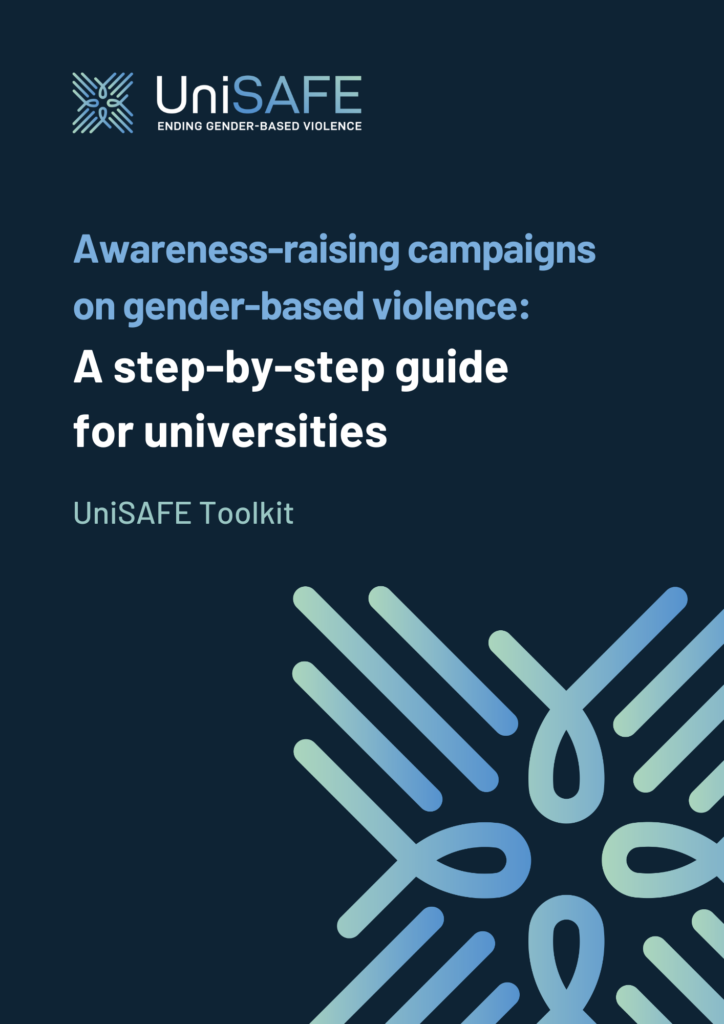
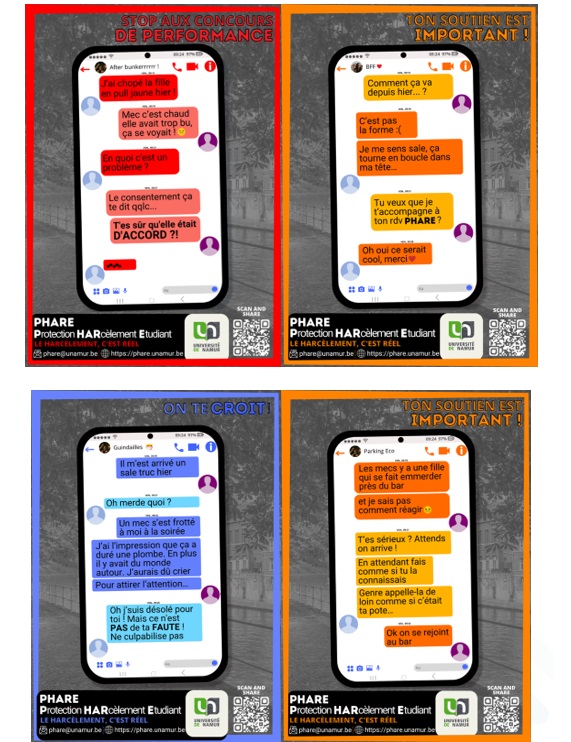
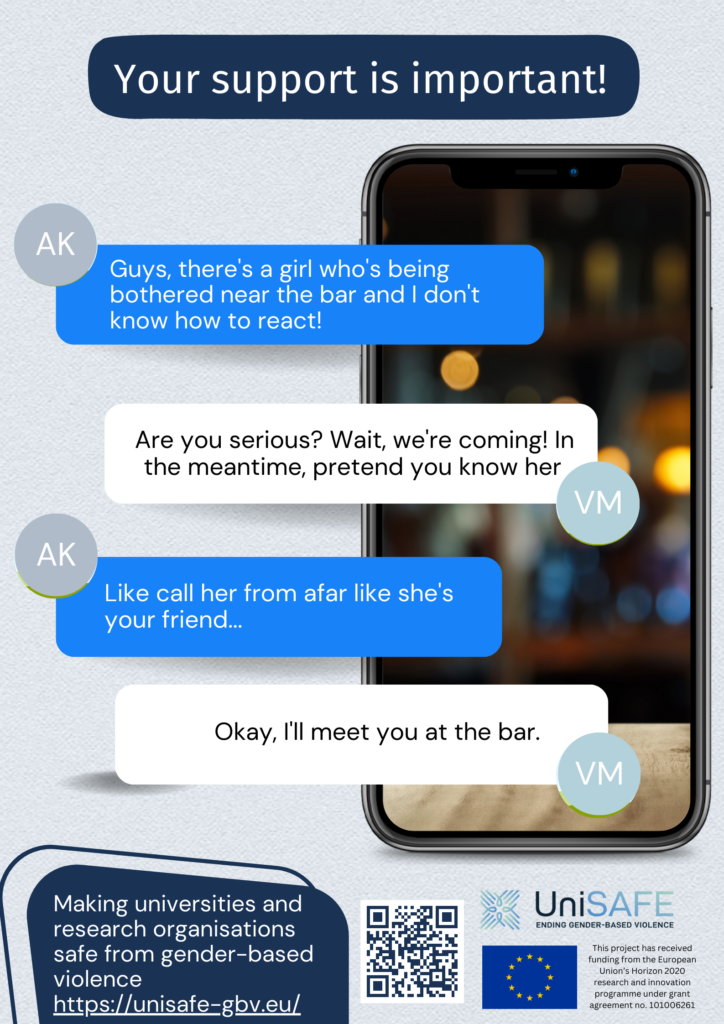
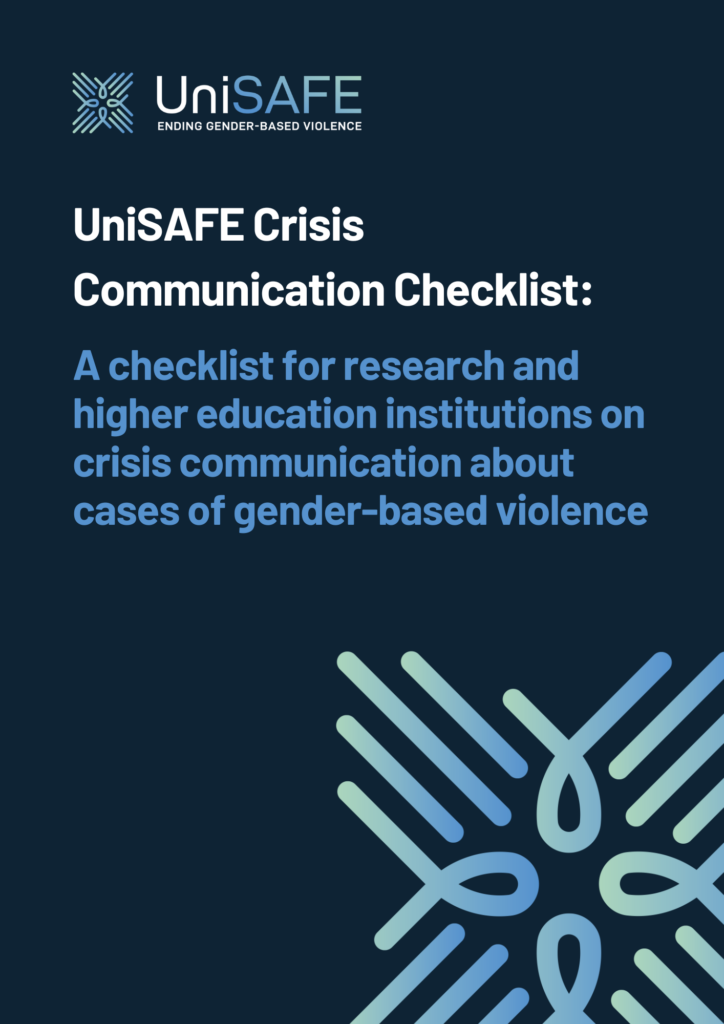
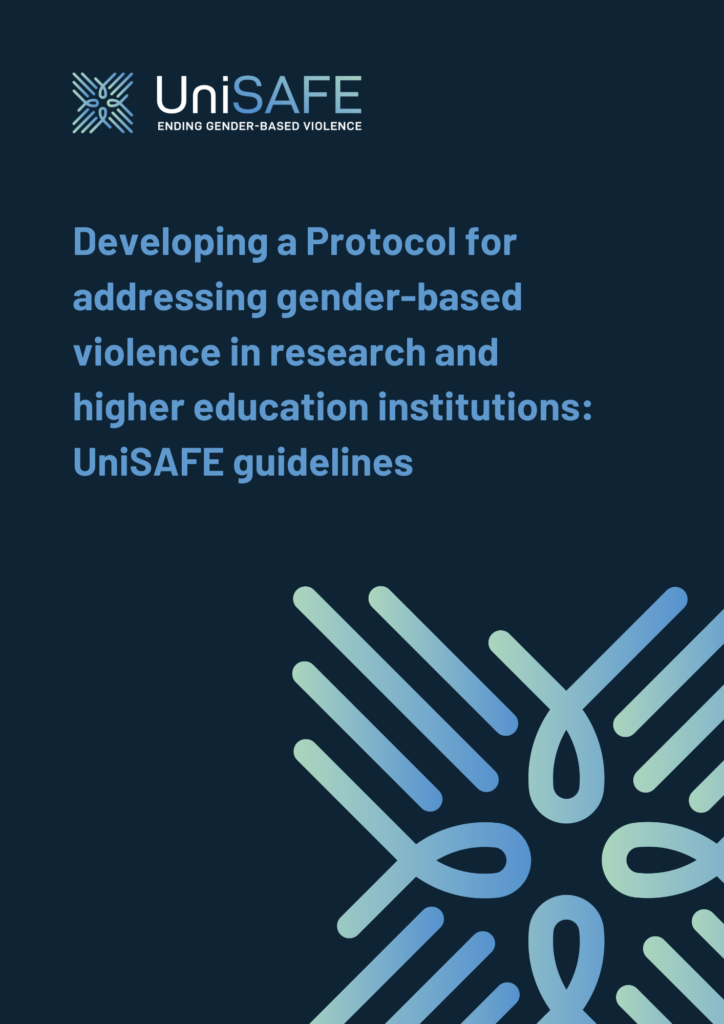
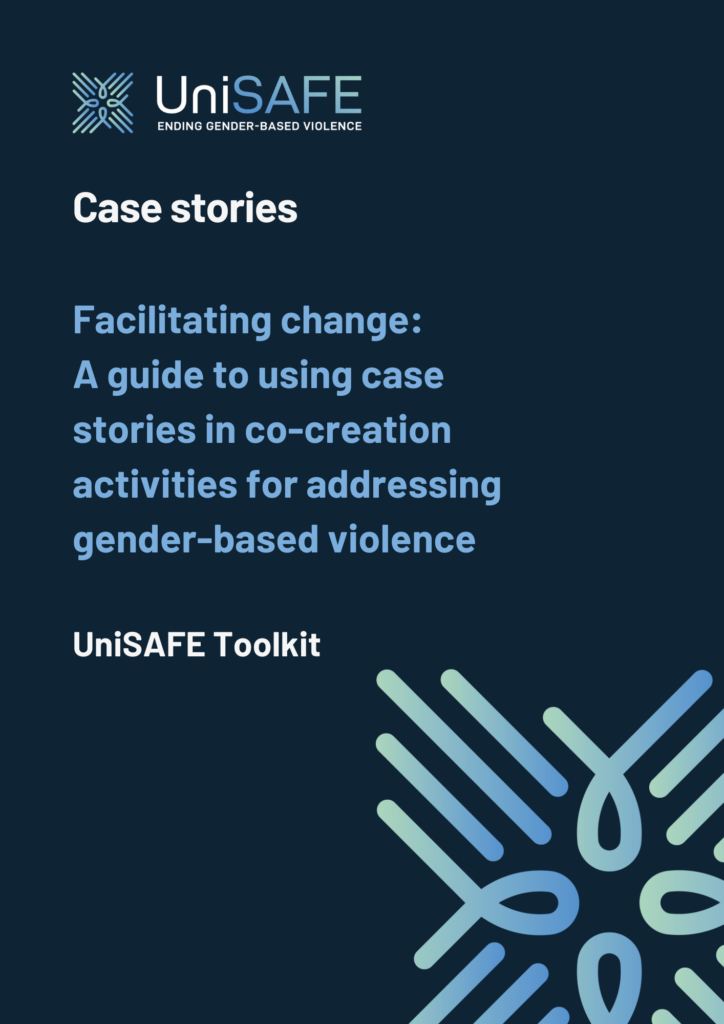
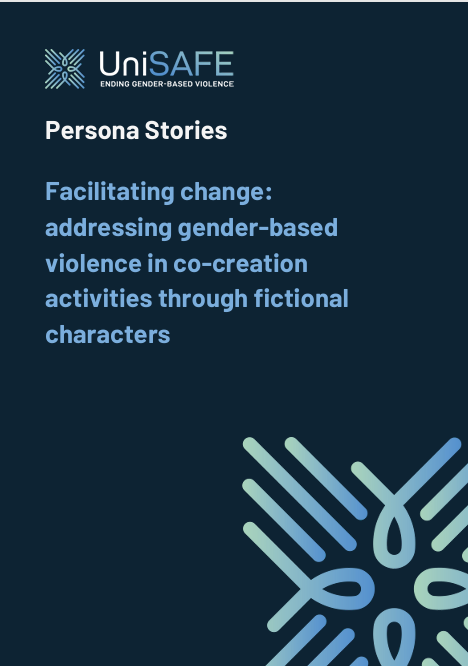
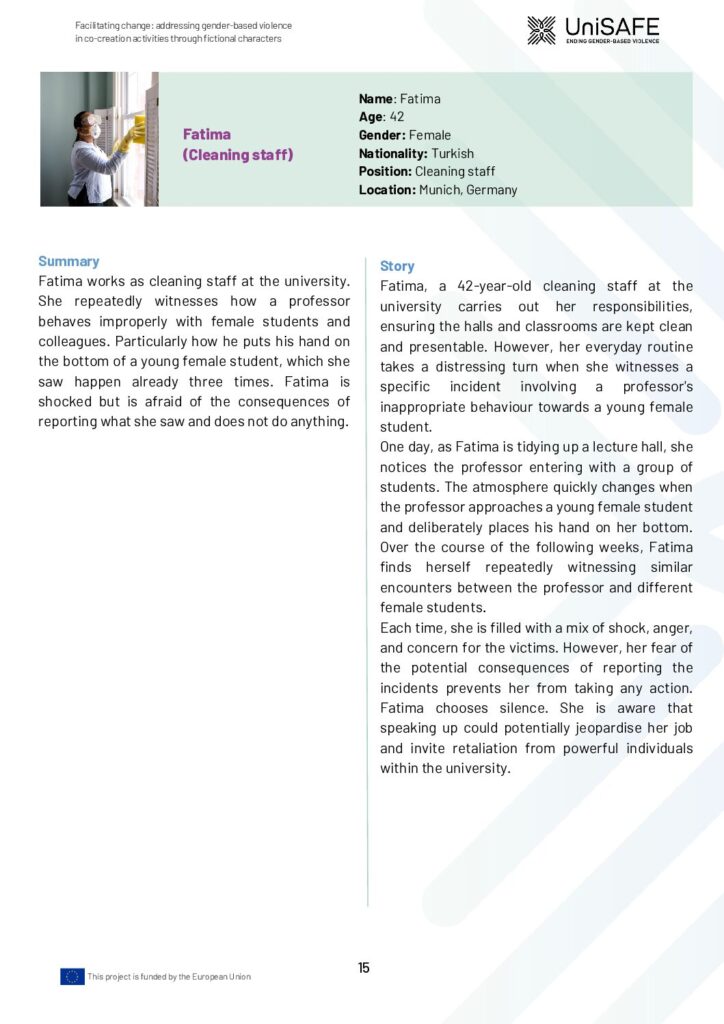
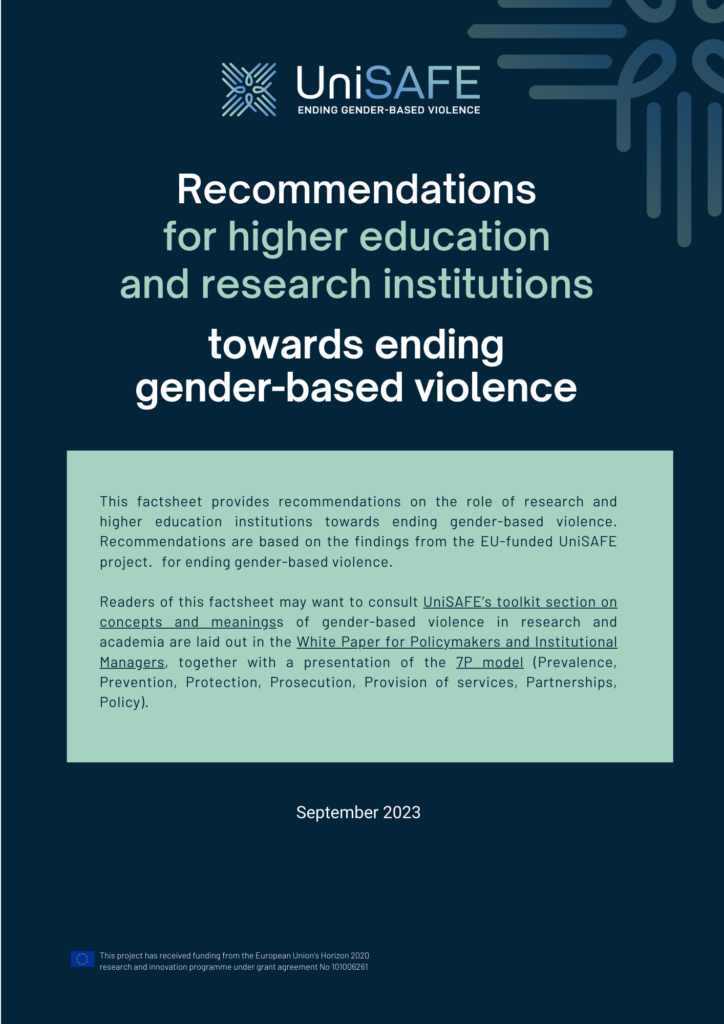
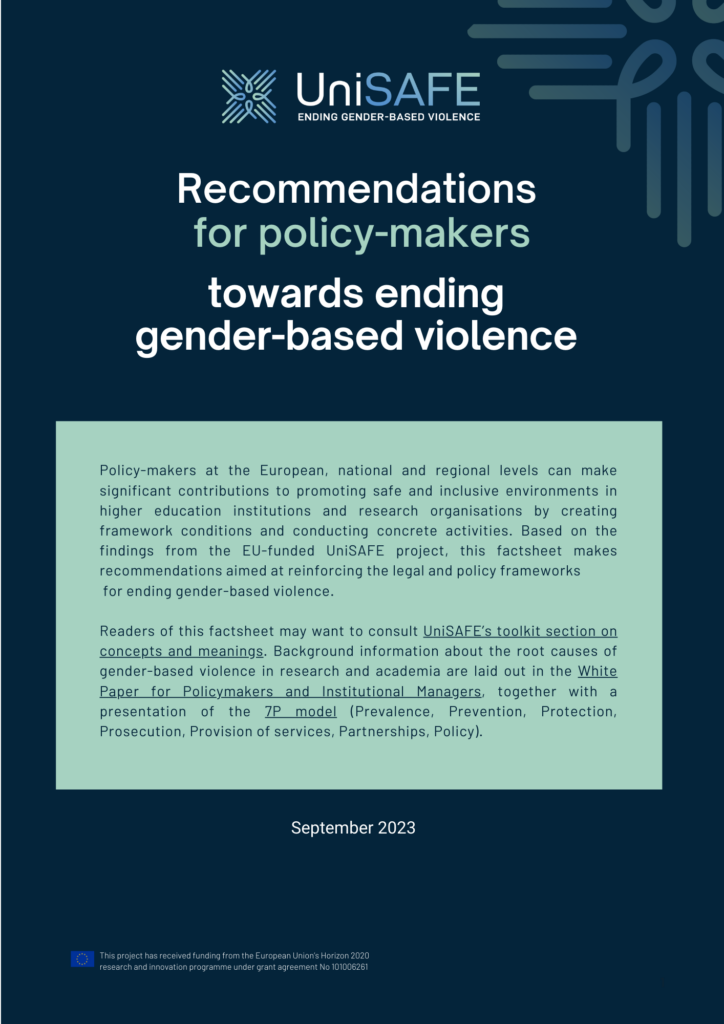
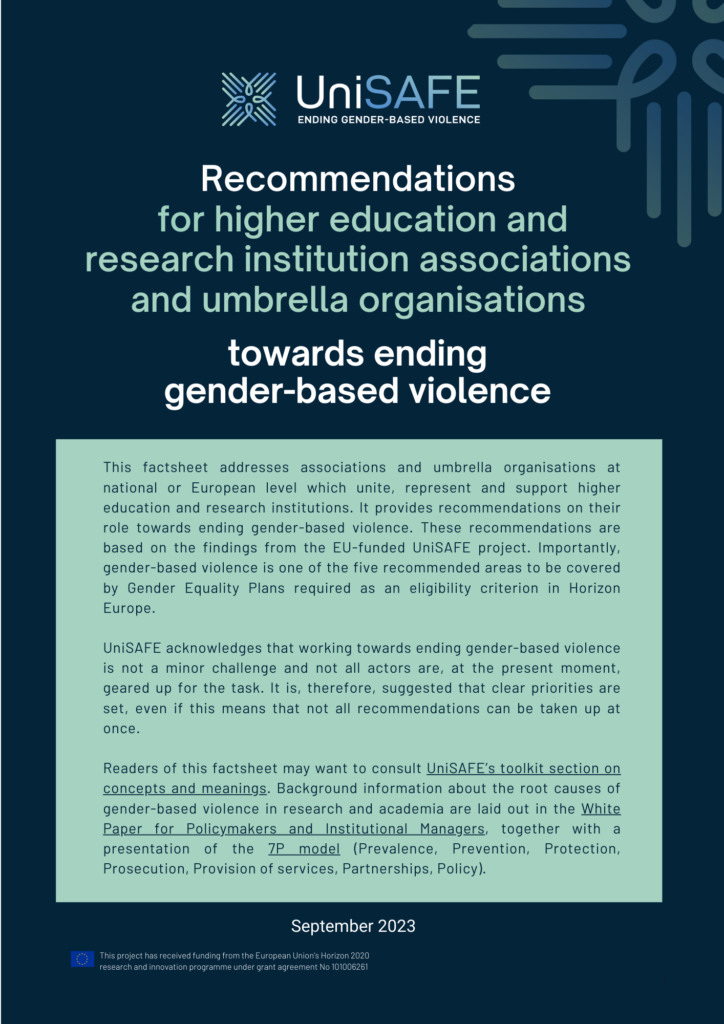
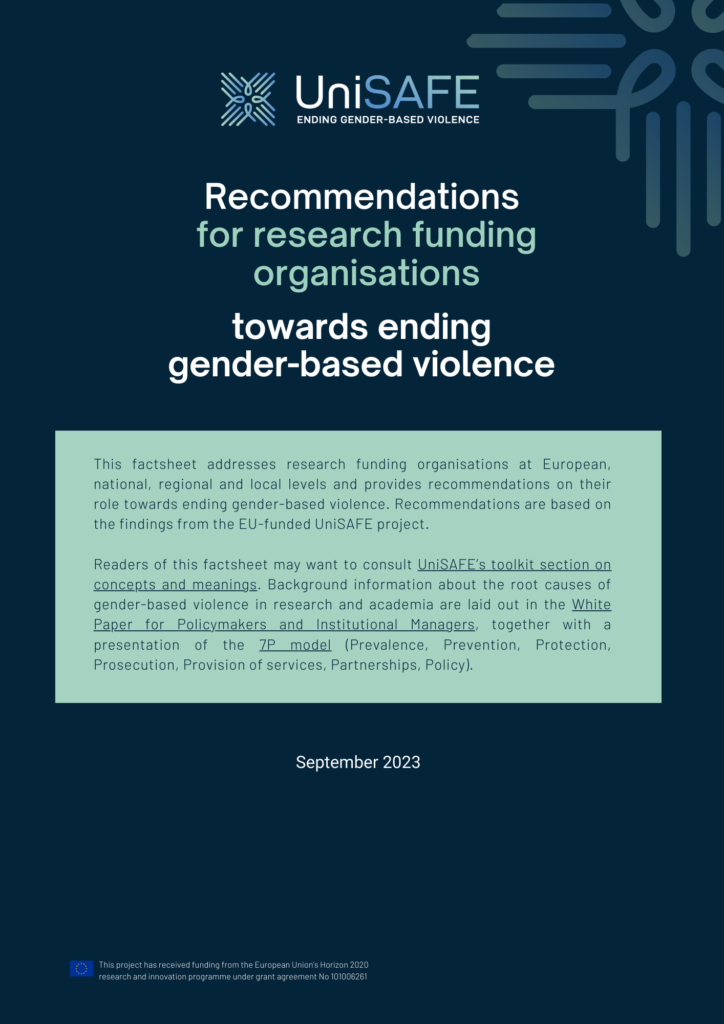
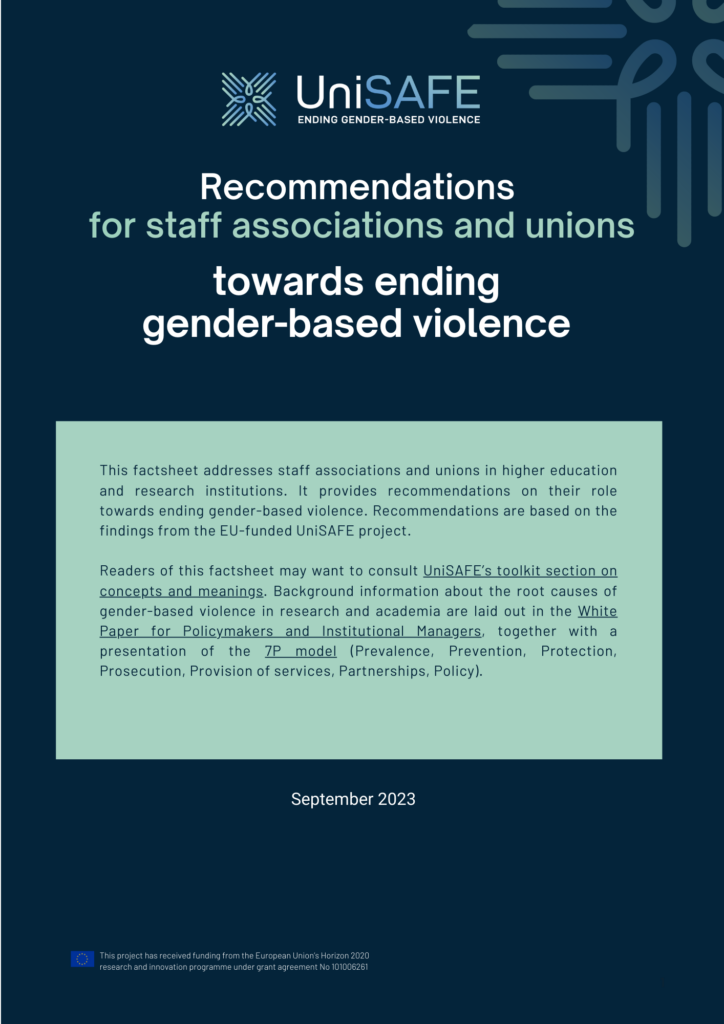
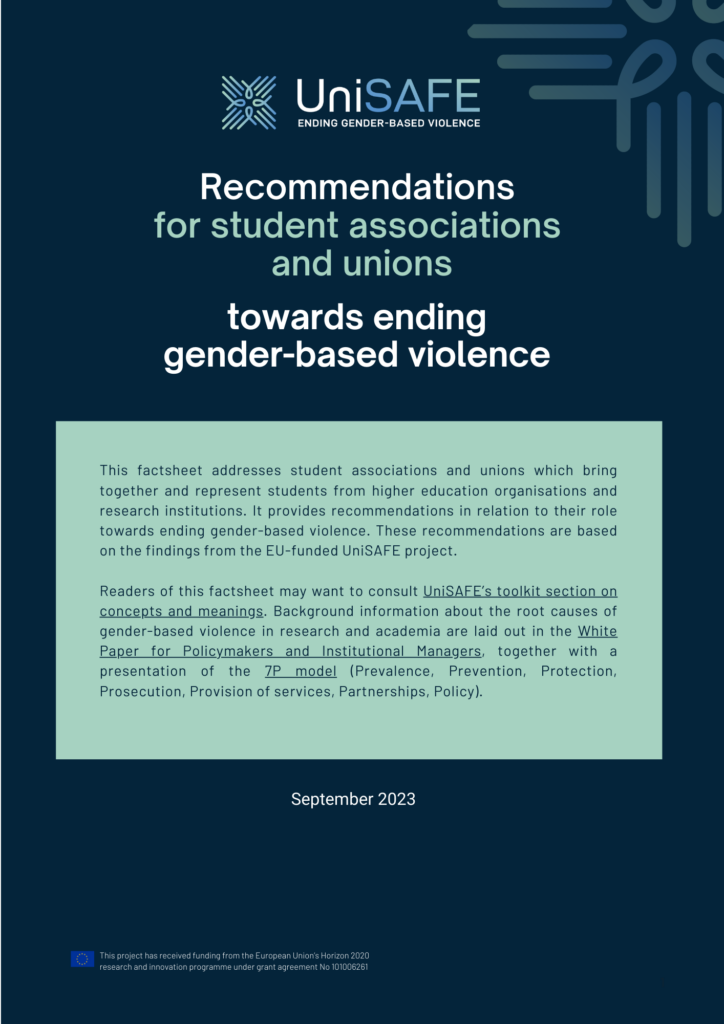
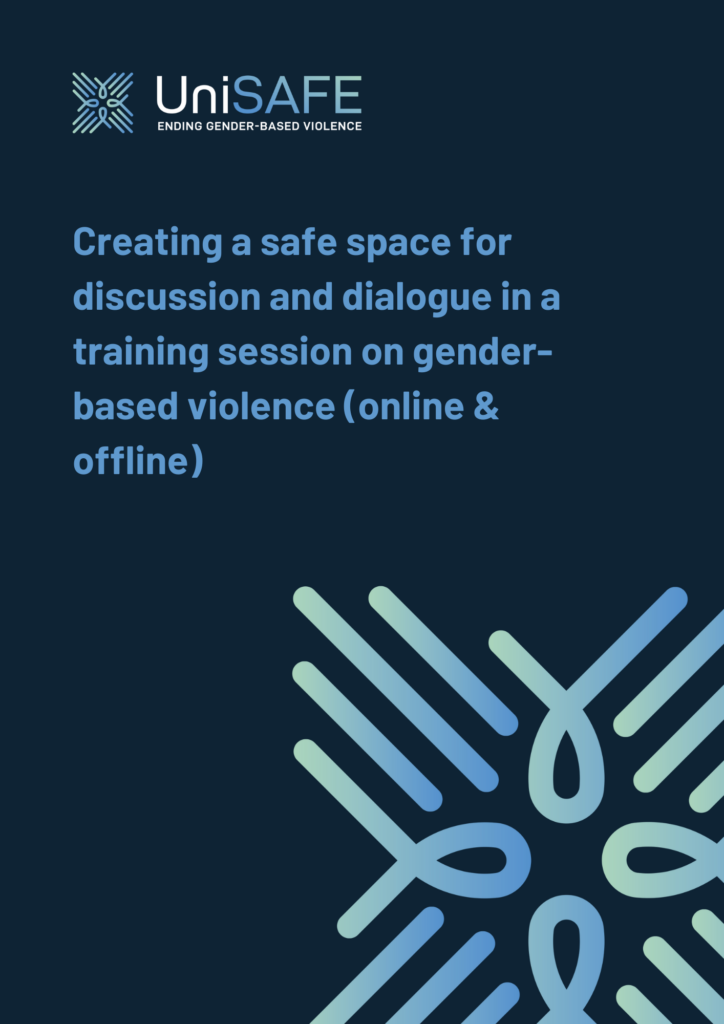
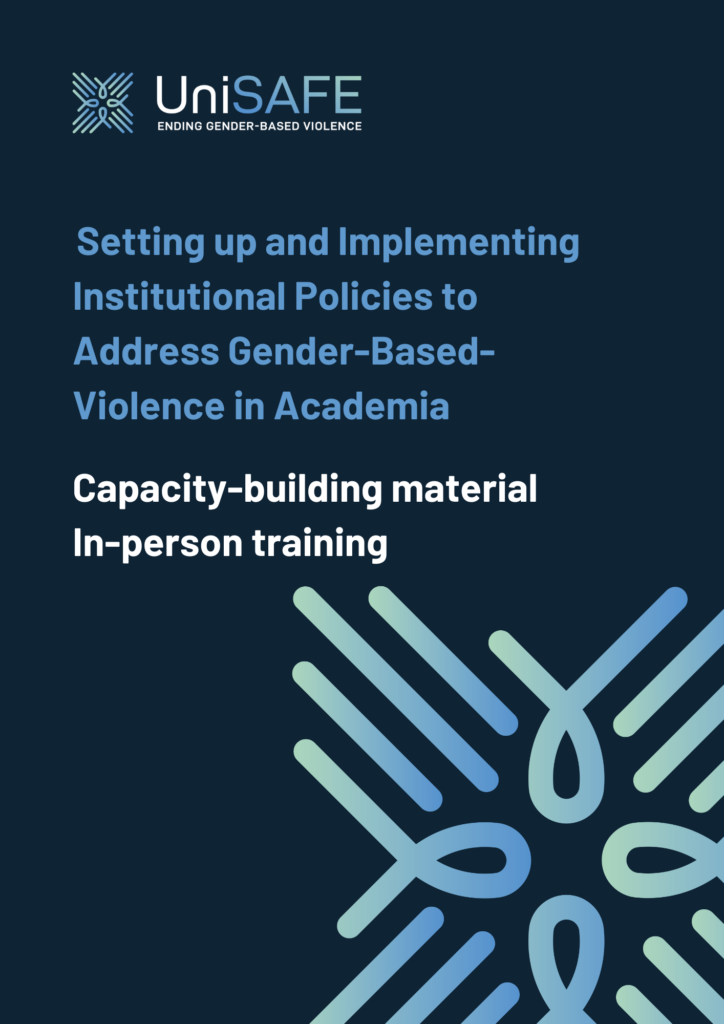
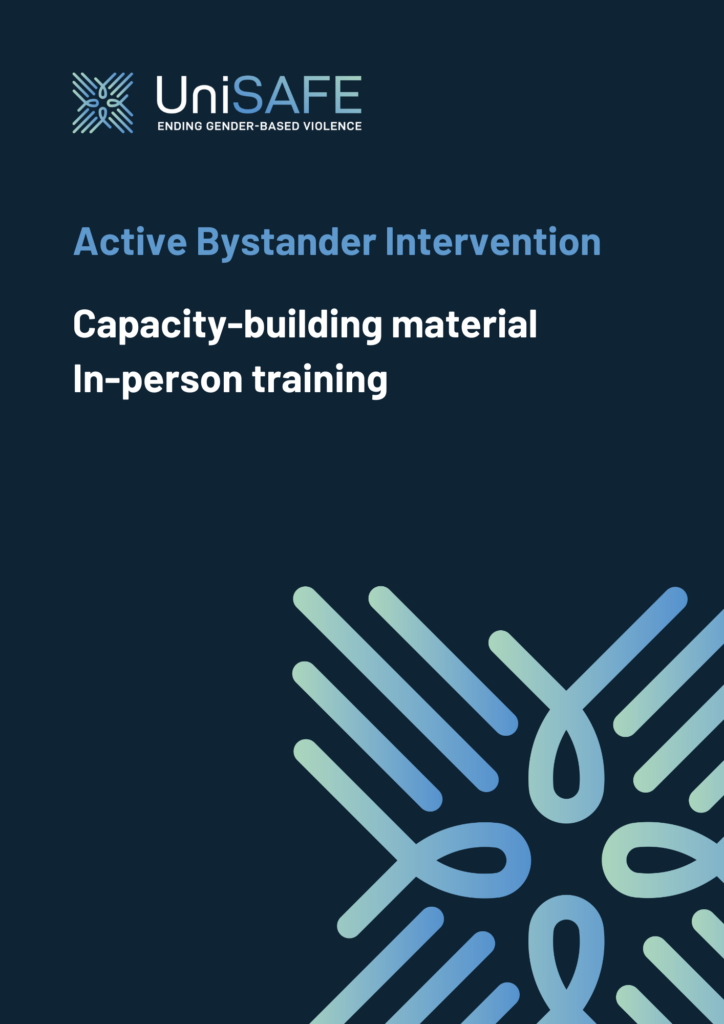
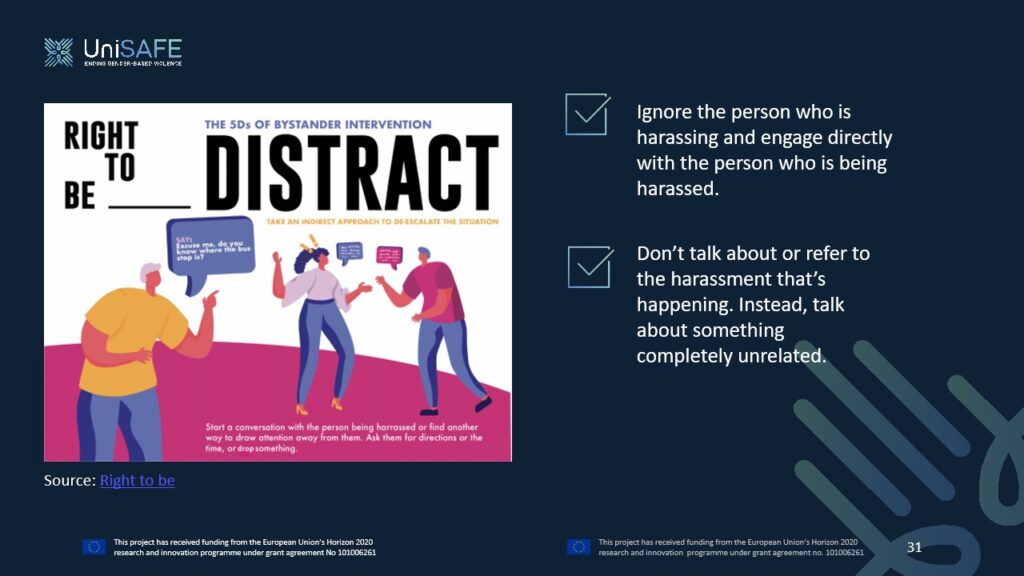
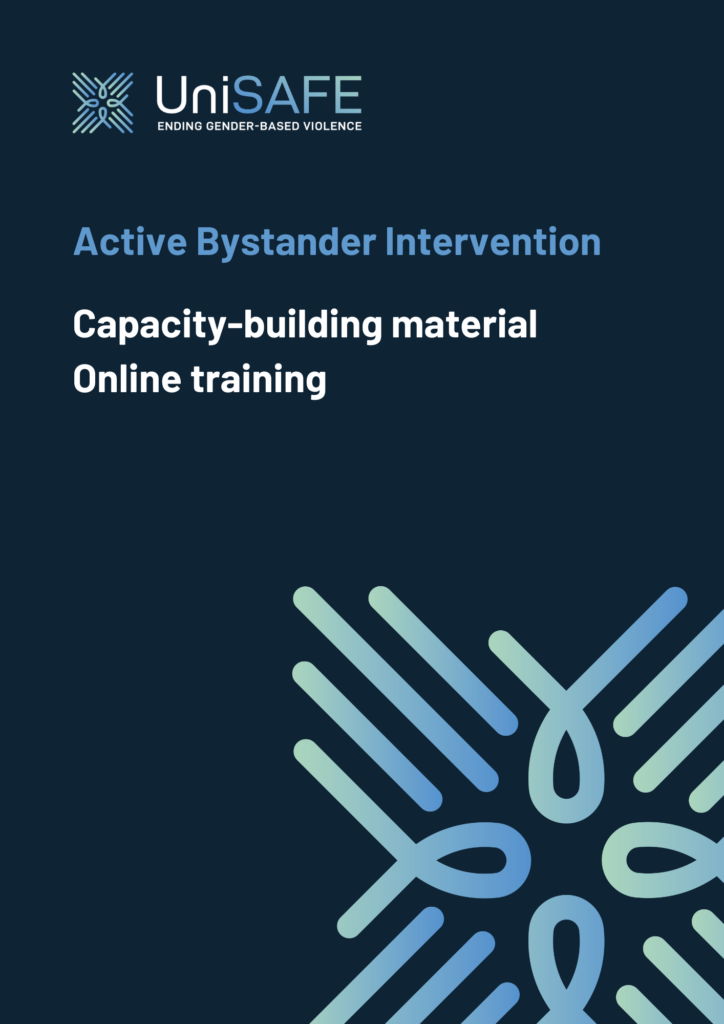
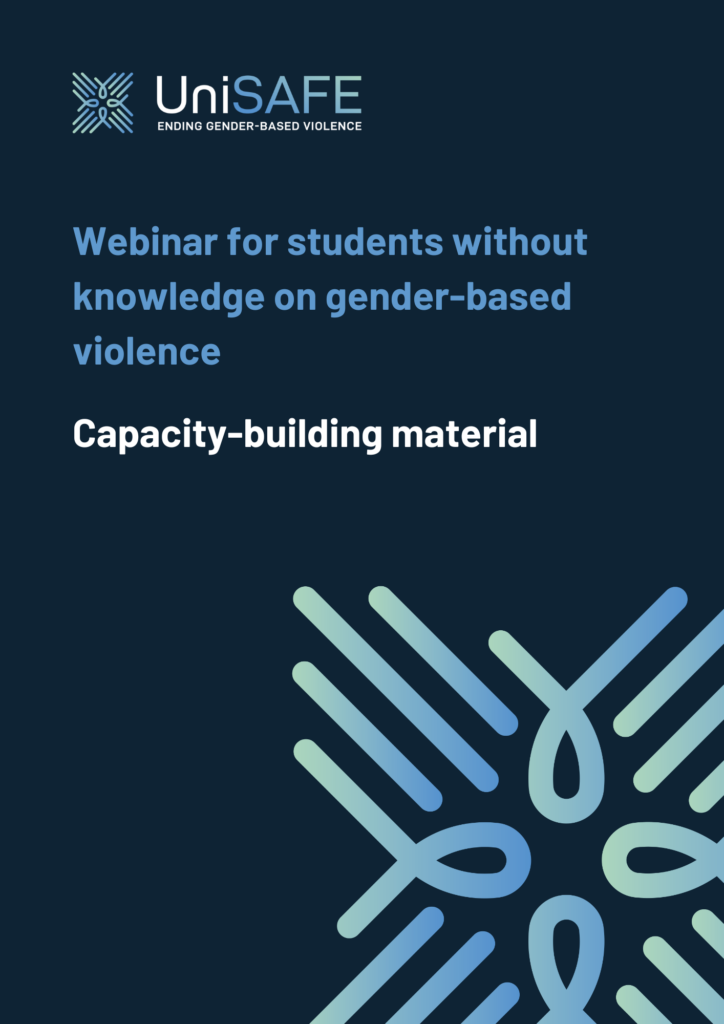
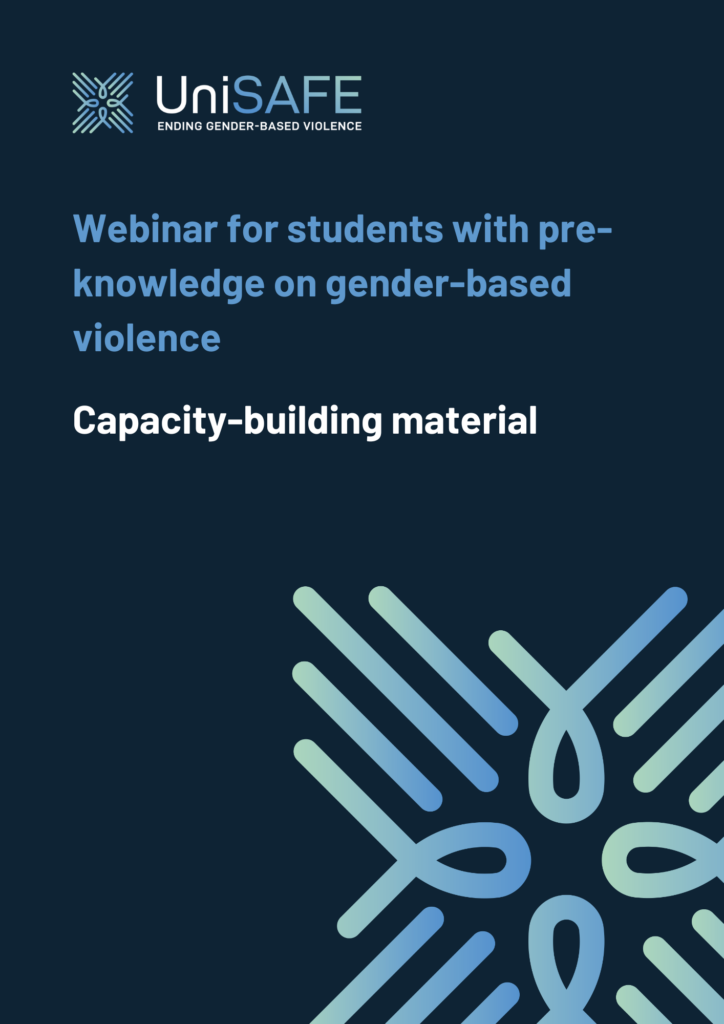

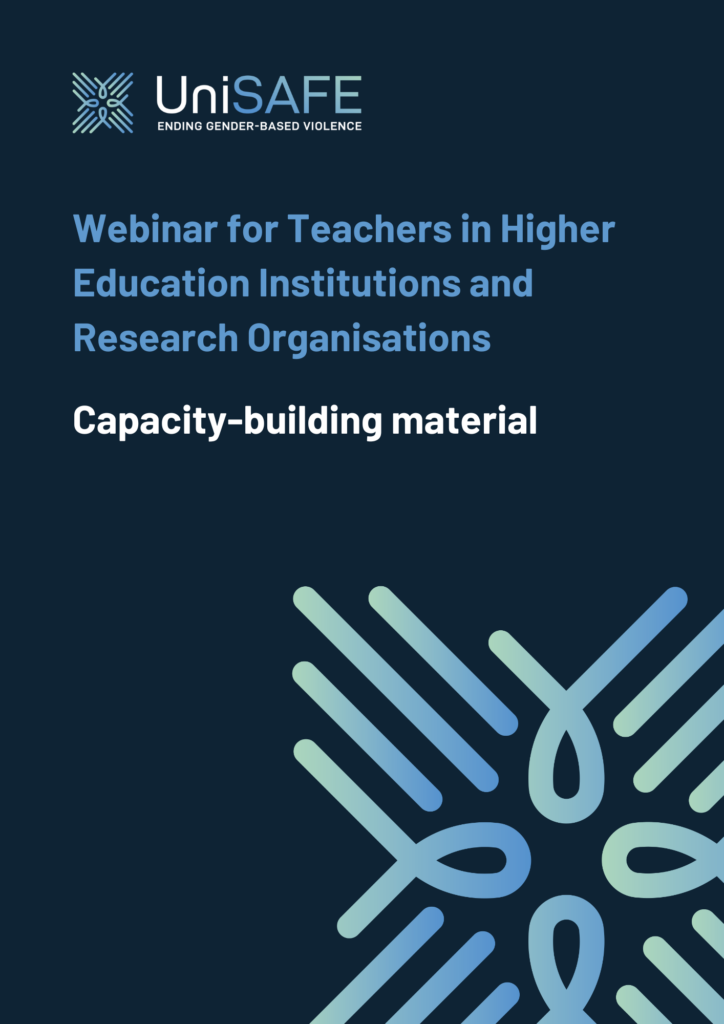
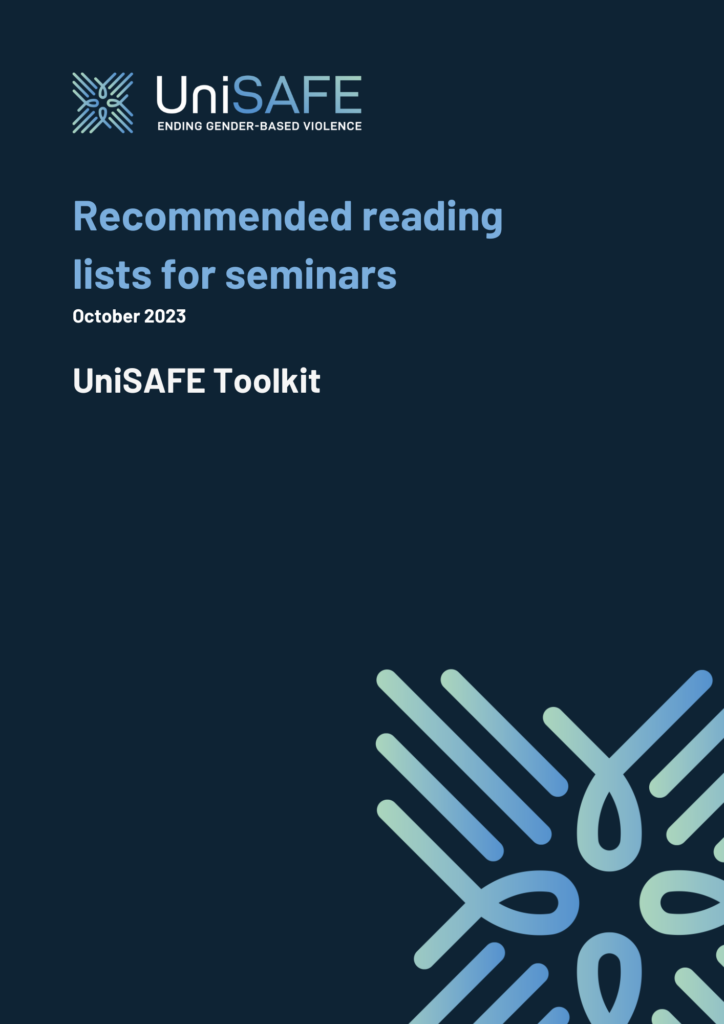

 The contents of this website were developed by Yellow Window and do not necessarily reflect the views of the EC. This project has received funding from the European Union’s Horizon 2020 research and innovation programme under grant agreement no. 101006261
The contents of this website were developed by Yellow Window and do not necessarily reflect the views of the EC. This project has received funding from the European Union’s Horizon 2020 research and innovation programme under grant agreement no. 101006261